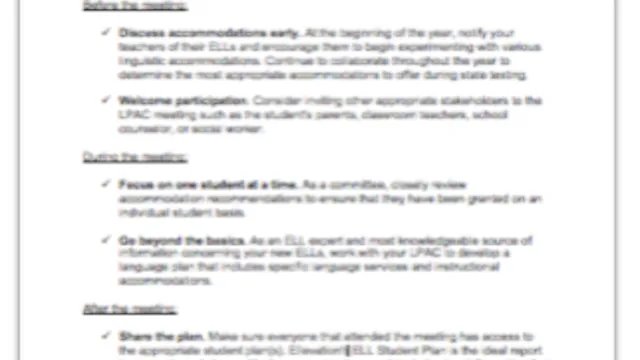Texas ELL Educators and Administrators: The LPAC Assessment Season is Upon Us


Texas ELL Educators and Administrators: The LPAC Assessment Season is Upon Us
ESL and Bilingual educators have played a critical role in our schools and society for a very long time. With significant workloads and few resources, they work hard to nurture the development of English Language Learners, welcome and teach the children of refugees from all over the world, and often help children become proficient in two languages—an outcome now recognized as contributing to success in many ways. The importance of their work is now growing as the percentage of English Language Learners grows nationally from about 10% currently to a predicted 25% in the coming generation. We need to do more to support their work.
Texas State Sen. José Rodríguez wrote recently that given demographic shifts, our children will either be “limited in English proficiency or will be proficient in two or more languages.” Senator Rodriguez advocates for an increase in funding for Bilingual and ESL programs, a policy shift which has great merit. In addition to an increase in funding, there are enhancements and changes to policies and programs that can help determine pathways for our nation’s students.
At Ellevation, we are focused on maximizing the impact of the Language Proficiency Assessment Committee (LPAC), a team that gathers to select the optimal program for every ELL. In addition to the selection of a program or service, the LPAC helps ensure that:
-
ELLs receive appropriate testing and linguistic accommodations;
-
Educators collaborate when an ELL also has an IEP; and
-
ELLs receive attention from a diverse set of educators and advocates.
In Texas and beyond, Ellevation offers educators a broad range of instructional and collaboration tools to support their work with English Language Learners. Educators can set goals for ELLs aligned to the ELPS. Educators can monitor progress and view trends on TELPAS and STAAR by individual students or groups. Educators can share information and notes on the strengths and needs of ELLs and generate an Individualized Learning Plan for each student. And, perhaps most exciting to the very busy educators in TX, they can complete LPAC meetings online, making it easy to view trends and ensure that all LPACs take place - saving a great deal of time.
For the next three weeks, this blog will feature a few ideas to enhance the LPAC process. For example, we will describe:
-
How a process for integrating ELPS-aligned goals into the LPAC meeting can bring a sharper focus on instruction and follow up.
-
How Ellevation’s Individualized Language Plan can be automatically created, making it easy to share with all educators critical decisions, student levels, and what a student should be able to do in each language domain following an LPAC meeting.
-
Insight into what the LPAC assessment process looks like at other school districts across Texas.
What ideas do you have to enhance the LPAC process? Please share your advice below. Additionally, check out the tips we rounded up to ensure your next LPAC meeting runs smoothly.